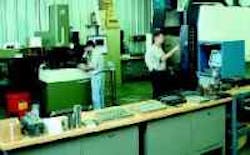EDM lets shop diversify
By teaming an EDNC43S EDM with an SNC64 graphite milling machine, both from Makino, Hunt-Wilde now prepares molds internally instead of farming out the work.
Hunt-Wilde's SNC64 milling machine cuts an electrode for the shop's EDM.
In an effort to pursue alternative markets, Hunt-Wilde Corp., a Dayton, Ohio, maker of vinyl injection-molded parts, expanded its manufacturing capabilities to include other product areas such as molded marine parts, foam grips, and profile extrusions. This diversity into new markets generated the need for manufacturing processes that reduced cycle times, shortened time-to-market, increased quality, and drove out operational costs. A big part of this initiative was EDM and graphite-milling equipment from Makino.
Hunt-Wilde invested in an EDNC43S EDM with high-quality surface-finish (HQSF) technology to burn its dies and molds, as well as an SNC64 milling machine to cut graphite electrodes and hard mill cavities. "This equipment lets us prepare molds internally instead of farming out the work, which lowers operational costs and enhances our flexibility to meet diversified customer needs," says Ken Hunt, vice president at Hunt-Wilde.
With both pieces of equipment, the shop has driven out tens of thousands of dollars of die/mold preparation costs from its operation while eliminating $40,000/yr worth of polish and bench work. In addition, cycle time production is now 10 greater with the Makino machinery than with the previous internal processes, says Hunt.
Because of the EDM's HQSF, which produces up to a 10- µ surface finish, Hunt-Wilde molds need little post-EDM buffing. Previously, the shop spent anywhere from a month to eight weeks polishing 24 blocks. Now it's done in hours, so there is a much quicker turnaround time for the shop's customers.
Prior to the new equipment, building molds was a long and tedious process, says Hunt. "At peak operations, we would build a simple mold in about six months. Because of the EDNC43S and SNC64 working in tandem, we completed four complex and multi-cavity molds in about 12 weeks," he adds.
According to Hunt-Wilde Engineering Supervisor Philip Bayldon, the company made wooden or aluminum carvings to demonstrate concepts to customers. Now, it produces actual prototypes. "With the Makino advanced EDM machining, combined with our 3D CAD/CAM network, it is now much easier to develop an actual mold and inject a prototype part true to size, texture, and color," he remarks.
A major benefit that Hunt-Wilde did not expect with the EDNC43S was flexible production. The machine's C axis lets the shop burn horizontally and at 360° to eliminate multiple setups with angle blocks and sine plates for design repetition in the cavity. "This is a huge plus for us," says Bayldon. "At peak operations, we produced six or eight cavity molds a year. Now we pump out 30 cavities in a week, or 200-plus molds a year for an increase of nearly 2,500 %."
For mold repair and support work, the Makino machinery makes the job fast in Hunt-Wilde's eight-person die/mold shop. That's because molds made on Makino equipment are easy to reburn and re-make, says Bayldon, which speeds up support to the company's 20 injection-molding machines ranging from 50 to 750 tons.
Makino Inc.
Mason, Ohio
www.makino.com
